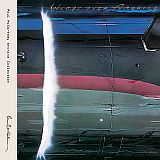
 New  |
 Wings Over America (2013 Remaster)  |
|
|
From Sir Paul's PopMatters interview with Christian John Wikane we learn that he is now a coffee drinker (with two sugars):
"Have I got my Starbucks? This is only ‘cause I wanted a coffee and there’s one across the road. This is not a commercial. I’ve become more of a coffee person, though not because of Starbucks."
The interview took place in the recording studio of David Kahne (Memory Almost Full's producer) in the hip Meatpacking District of New York city not far from the Stella McCartney boutique. Sir Paul is pleased with the results of his leaving a major record label:
“I think that they [the major record labels] admit themselves that they’re in a very awkward time. They had it all their own way for a number of years. They’ve got huge stables of acts and artists on their books so it’s very difficult to get singled out as an artist. You can’t get arrested. You’ve got a good album and no one will listen to it just because they’ve got to listen to 300 other albums. I think that’s the phenomenon that people are getting fed up with.”
He is also enjoying performing in the intimacy of smaller venues, such as this week's “secret” concert at the Highline Ballroom because it reminds him of the early days of the Beatles:
"When we were starting out, all our gigs were like that. They were all little ballrooms or little clubs. It’s almost like a family party as opposed to a big arena show. I just like the intimacy and the sweatiness and the one-on-one. In fact, I wish it were a bit sweatier!”
Speaking of today's music, Sir Paul believes that musicians refer to the past for inspiration:
"I think everyone kind of does that. We used to do that. We would refer to Elvis, Chuck Berry, and Buddy Holly a few years before we made it. We referred to it and then moved on from it, so I think it’s a good jumping off platform. There are some people, maybe older fans, who will say to me, ‘Your music’s so much better than anything they’ve got today. It’s rubbish today’. I think, ‘No, no. That’s dangerous talk’. I think it’s just too cheap a shot to say, ‘It’s better than all this hip-hop stuff’. I have a very wide taste in music. I will go back before my father’s era to Fred Astaire and right up to hip-hop."
In fact, Memory Almost Full trails a hip-hop album on the Billboard charts this week. According to Sir Paul:
"It’s really cool! It’s nice to be in the Top 3. It never hurts. I think it’s kind of interesting to be up with contemporary acts like that. It’s a good sign."
But what about the critics? They have not always been kind.
"After the Beatles and during the Wings period, I think there might have been a period there where I just wasn’t as into what I was doing and so they might be right about certain periods there. On the other hand, they might be wrong. A lot of people surprise me because I’m ready to buy that theory: ‘You’re not great all the time’. What will happen is someone will say, ‘No, Paul that is my favorite songs of yours’. I remember talking to Trevor Horn on this subject and I said, for instance, ‘I’ve written a song called ‘Bip Bop’. The lyrics are ‘Bip-bop-bip-bop-bib-n-bam’. He said, ‘My fucking favorite of yours, man’. I go, ‘All right, well let me reexamine this again.’ He said, ‘It’s not about the lyric. It’s the song, man. It’s great’. My son singled that one out as something he liked, but it was criticized as being banal.
"I write everything thinking it’s good. I think some of it is probably better than other bits. I’m sure there’s a pecking order of what I’ve written, but I stand by it all and it interests me that some people stand by it more than I do and will single out a piece and say, ‘I love the way that’s kind of loose and sort of flaky. I like the way you did that’. I’m encouraged by that.”
What about his classical work?
"It’s still the same sort of land to me. What [classical music] gives me is a new ball game in which I haven’t really explored ... but it’s still music, so I still am doing what I do but in another area. For instance, I don’t have to sing the songs, normally. I’ve had sopranos, soloists, choirs singing it. It’s very interesting to grapple with another kind of music, although, like I said, I don’t see any barriers. It’s more long form, so it’s more like writing a novel ... the pop song is more like the short story form. What I have to think about when I write more the classical stuff is to not write a collection of short stories. I have to actually realize that I want ‘through flow’. I believe it’s called durchkomponiert in German: ‘through-composed’. It’s a nice idea—not just rejecting a melody because you’re onto the next track. You can bring a variation back.”Sir Paul also discussed his art work and how he was inspired by the renowned abstract expressionist Willem de Kooning:
"He was so offhand about the meaning of one of his paintings. I said to him, ‘Bill, what is it?’ He said, ‘I don’t know. It looks like a couch, huh?’ and it just totally flipped me. It just relieved me of every block and every sort of worry I had about ‘Oh, it must be Hugely Significant’. It was like no, it’s paint.”
Sir Paul discussed the significance of the "ghostly apparitions" in the "Dance Tonight" video, how they symbolize his public and private self:
"All those ghosts are kind of in me rather than floating around. People are seeing me as ‘Paul McCartney’ but I’m James Paul McCartney. I’m this kid that was born in Liverpool. Inside me I’m still that kid, but I have to be aware that I’ve got this film, this ‘apparition’ of fame. I have to take that onboard. It’d be kind of stupid for me to go, ‘Please stop looking at me.’ That’s not gonna work.”
He has also considered his own mortality:
"I’m kind of fatalistic about it really. I know when John died, people sort of said, ‘Are you really worried?’ I said, ‘No’. When your number’s up, it’s up. I concentrate on living day to day. I don’t know what I’d like my funeral to be outside of the track on the album [’End of the End’] and I’m not even sure if I want that. It’d be kind of good for people to ... celebrate your life rather than sit around moaning. It’s something I don’t really think about too much. I’m too busy living. I just enjoy what I do and get on with it.”
(kindly submitted by PLUGGED correspondent Joan M. Hopkins)
| back |
©1994-2024 Harald Gernhardt. All Rights Reserved